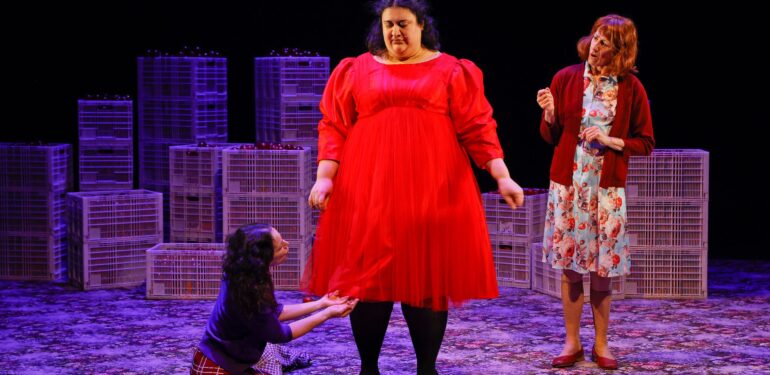“Looking For Alibrandi” is now showing at the Malthouse Theatre. Based on the beloved novel by Melina Marchetta published in 1992, which was turned into a film in 2000, the story has now been adapted for stage. Directed by Stephen Nicolazzo and written by Vidya Rajan, I attended last night with my teenage daughter, and afterwards, with tears in our eyes, we exclaimed “that was the best show ever!”. Not an understatement. It really was.
Now I have to write this review without tearing up, because that’s the depths at which this stage adaptation moved me, or more so, how much it meant to me. Being of Cypriot descent, the book itself was paramount in helping me accept my cultural heritage when I was a teenager. When the film was made, it was a declaration of sorts: the wogs are here and we may have rituals that seem weird, but they are ours and we are not going to apologise for them.
I was sceptical, to be honest, about the stage adaption – after the film, how much more could the stage add? This scepticism comes from a place of attending multiple stage adaptions only to be disappointed and annoyed. But that was simply not the case here.
In a recent interview, Melina Marchetta said that over the years she has had offers to adapt for stage but turned them all down. I can see now, why that might be. Back then, it may have been overkill. But today, the text has had thirty years to breathe, and while the story is set in the 90s, this stage adaptation is told through lens of a diverse creative team, living and breathing in the year 2022. Watching this play was like holding a telescope and looking back with the hindsight and wisdom of what we know about the migrant experience today, wisdom we did not know back then, pain that we have had to carry over the last thirty years and still carry as children of migrants.
Once again, as is the case with Stephen Nicolazzo and the projects he directs, he was not going to conform to anything. There’s always an element of surprise in seeing one of his shows – what’s he going to dish us up this time? Here this was executed cleverly with a diverse cast that shatters stereotypes and sees our protagonist Josie not as a stick figure, but as a beautiful full figure, her size celebrated with costume (Katie Davis) and choreography (Rosa Voto), the acting by Chanella Marci, unapologetic, heartfelt, vulnerable and captivating.
Also interesting was Stephen’s choice of writer Vidya Rajan, who is not of Italian descent. Surprisingly, Vidya was able to provide a widened perspective on the migrant experience and what it feels like to be othered, but also, great empathy to what it was like to be part of wog culture back in that time, and how those remnants still linger in Australian society today. At one point the phrase “dirty wog” was spat and the whole theatre gasped – I mean, this show was truly, edge-of-your-seat theatre, which is a testament to Vidya’s writing. Her writing is to be applauded, as there were great comedic moments as well as moments of lament, sorrow and frustration.
This adaptation is layered and textured, exploring three generations of women, as opposed to focusing mostly on Josie – as was the case with the book and film – and how their stories marry together and are realised in the context of Australian society. The set design (Kate Davis) which was consistent throughout, consisted of the traditional kitchen table, a huge floral “wog” carpet, and one hundred boxes of tomatoes (yes, I actually counted them), piled on top of each other at varying heights, and the lighting design (Katie Sfetkidis) worked well with this set, especially when the lights turned red – it’s like you were sitting inside a huge tomato. When you enter the theatre Italian music is blasting from the speakers, loud and euphoric, like a proclamation “the wogs are here, the wogs are still here in 2022 and we have stuff to say even today!”. The music design (Daniel Nixon) worked well to match the emotional state of the writing, with a combination of English and Italian tracks. Throughout the play, the ritual of making the tomato sauce was used a haunting metaphor for inter-generational trauma, superstition, joy and the migrant experience.
If the book Looking For Alibrandi moved you when you were young, you simply must go and see this play. It’s like coming full-circle. It’s a real must.
– Koraly
Koraly Dimitraidis is a Cypriot-Australian writer and performer and the author of Love and F—k Poems and Just Give Me The Pills. Her theatre show “I say the wrong things all the time” premiered at La Mama in 2016. She received Darebin Speakeasy funding in 2020 with Stephen Nicolazzo to develop a new theatre work. Koraly’s opinion articles/essays have been published widely including international publications in The Washington Post and The Guardian.
“Looking For Alibrandi” runs 9th July – 31st July at Malthouse Theatre, St Kilda. Book tickets here.
It is also playing in Sydney at Belvoir 1st October – 6th November
Disclosure: The Plus Ones were invited guests of The Malthouse Theatre
Photo credit: Jeff Busby




